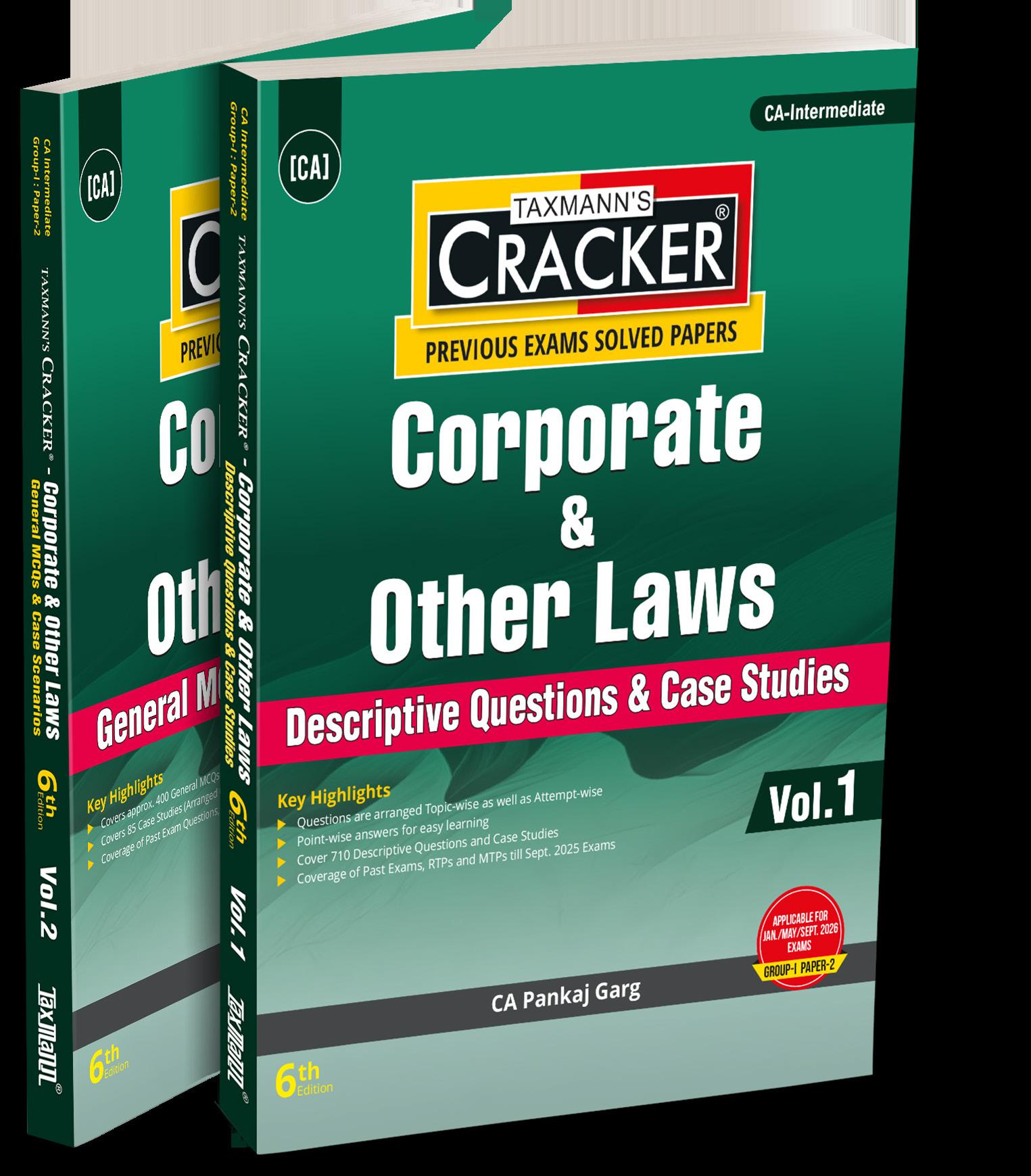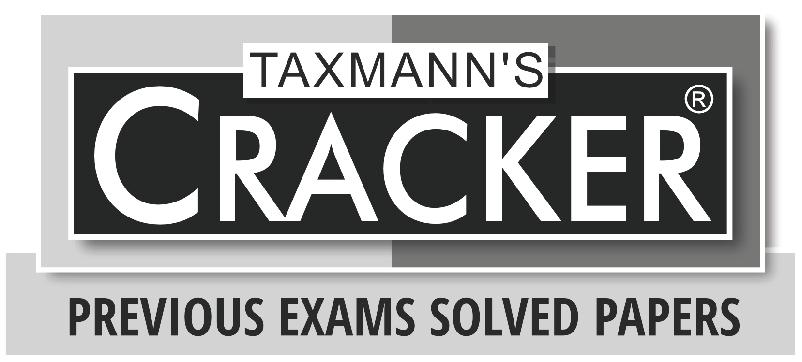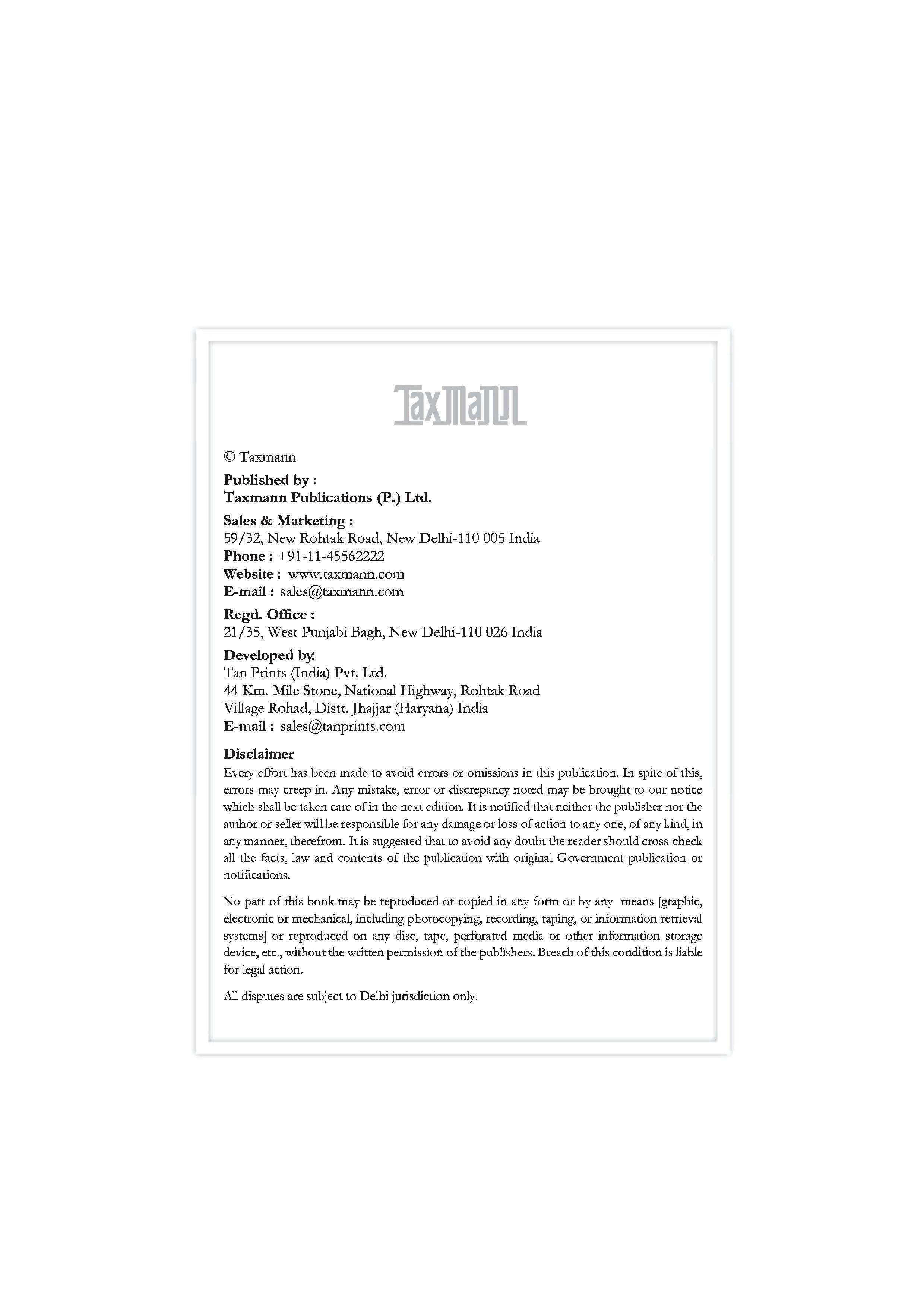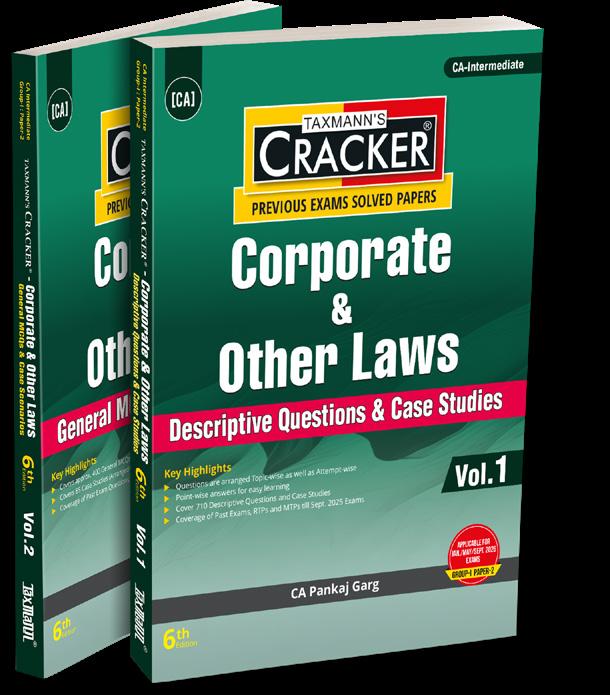








1.1 - Definitions
Q.1











Q.1

X Industries Ltd. is a company in which 25% of shareholding is held by Central Government; 10% shareholding is held by Government of Maharashtra and 15% shareholding is held by Central Government and Government of Rajasthan jointly. Examine whether, X Industries Ltd. is a government company.
Ans.: Government Company:
As per Sec. 2(45) of Companies Act, 2013, government company means any company in which not less than 51% of the paid-up share capital is held by Central Govt., or by any State Government or Governments, or partly by Central Government and partly by one or more State Governments, & includes a company which is a subsidiary company of such a government company.
In the given case, X Industries Ltd. is a company in which 25% of shareholding is held by Central Government; 10% shareholding is held by Government of Maharashtra and 15% shareholding is held by Central Government and Government of Rajasthan jointly.
Total shareholding of X Industries Ltd. held by various governments is 50%.
Conclusion: X Industries Ltd. is not a government company as the shares held by various governments in aggregate is less than 51%.
Q.2 The statutory auditors of a company were required to issue a certificate on the net worth of the company as per the requirement of the management as of 30 September 202 4 computed as per the provision of section 2(57) of the Companies Act, 2013.
The company had fair valued its property, plant and equipment in the current year which was mistakenly taken into retained earnings of the company in its books of account. Please advise whether this fair valuation would be covered in the net worth of the company as per the legal requirements.
As per Sec. 2(57) of Companies Act, 2013, net worth means the aggregate value of the paid-up share capital and all reserves created out of the profits, securities premium account and debit or credit balance of profit and loss account, after deducting the aggregate value of the accumulated losses, deferred expenditure and miscellaneous expenditure not written off, as per the audited balance sheet, but does not include reserves created out of revaluation of assets, write-back of depreciation and amalgamation.
In the given case, company had fair valued its property, plant and equipment in the current year which was mistakenly taken into retained earnings of the company in its books of account.
Conclusion: Even if the company has taken the fair valuation to the retained earnings in its books of account, the resultant credit in reserves would be in the category of ‘reserves created out of revaluation of assets’ which is specifically excluded in the definition of ‘net worth’ in Sec. 2(57) and hence should be excluded by the company.
Further, auditors should also consider the matter related to accounting of this reserve separately at the time of audit of books of accounts of the company.
Q.3 A Pvt. Ltd. is wholly owned subsidiary of AB Ltd., a public company incorporated under the Companies Act, 2013. A Pvt. Ltd. wanted to avail exemptions as provided to private companies. Examine whether A Pvt. Ltd. can do so.
Ans.: Status of wholly owned private subsidiary company:
As per Sec. 2(71) of Companies Act, 2013, Public company means a company which:
(a) is not a private company; and
(b) has a minimum paid-up share capital as may be prescribed.
It is also provided that a company which is a subsidiary of a company, not being a private company, shall be deemed to be public company for the purposes of this Act even where such subsidiary company continues to be a private company in its articles.
Conclusion: Since A Pvt. Ltd. is subsidiary of AB Ltd., which is a public company, therefore A Pvt. Ltd. will be deemed to be a public company and will be not allowed to avail exemptions provided to a private company.
Q.4
Examine the below mentioned situation and answer whether the entities are related parties for the purpose of Sec. 188:
(i) XYZ Pvt. Ltd. has two subsidiary companies, Y Pvt. Ltd. and Z Pvt. Ltd.
(ii) XYZ Ltd. a public company, has two subsidiary companies, Y Pvt. Ltd and Z Pvt. Ltd.
Ans.: Related Parties:
As per the section 2(76) (viii), related party with reference to a company, means any body corporate which is:
(A) a holding, subsidiary or an associate company of such company;
(B) a subsidiary of a holding company to which it is also a subsidiary; or
(C) an investing company or the venturer of the company.
However, clause (viii) shall not apply with respect to Sec. 188 to a private company.
As per Sec. 2(71), a private company which is a subsidiary of a public company will be deemed to be a public company.
Conclusion: Applying the provisions as stated above, following conclusions may be drawn:
(i) Y Pvt. Ltd and Z Pvt. Ltd are not related parties for the purpose of Sec. 188. However, if Y Pvt. Ltd and Z Pvt. Ltd. have common directors, then they will be deemed to be related parties because of section 2(76)(iv).
(ii) As a private company which is a subsidiary of a public company will be deemed to be a public company, so the exemption that provisions of Sec. 188 not applicable to private companies, will not be available to Y Pvt. Ltd and Z Pvt. Ltd. Hence, Y Pvt. Ltd and Z Pvt. Ltd are related parties. In addition, XYZ Ltd. will also be related Party to Y Pvt. Ltd and Z Pvt. Ltd.
Q.5 The paid-up share capital of Saras Private Limited is ₹ 1 crore, consisting of 8 lacs Equity Shares of ₹ 10 each, fully paid -up and 2 lacs Cumulative Preference Shares of ₹ 10 each, fully paid-up. Jeevan (JVN) Private Limited and Sudhir Private Limited are holding 3 lacs Equity Shares and 50,000 Equity Shares respectively in Saras Private Li mited. Jeevan Private Limited and Sudhir Private Limited are the subsidiaries of Piyush Private Limited.
With reference to the provisions of the Companies Act, 2013 examine whether Saras Private Limited is a subsidiary of Piyush Private Limited? Would your answer be different if Piyush Private Limited has 8 out of 9 Directors on the Board of Saras Private Limited? [RTP- May 18, May 19]
Ans.: Status of Subsidiary company:
As per Sec. 2(87) of the Companies Act 2013 "subsidiary company" or "subsidiary", in relation to any other company (that is to say the holding company), means a company in which the holding company:
(i) controls the composition of the Board of Directors; or
(ii) exercises or controls more than one-half of the total voting power either at its own or together with one or more of its subsidiary companies:
For the purposes of this clause:
(a) a company shall be deemed to be a subsidiary company of the holding company even if the control referred to in sub-clause (i) or sub-clause (ii) is of another subsidiary company of the holding company;
(b) the composition of a company's Board of Directors shall be deemed to be controlled by another company if that other company by exercise of some power exercisable by it at its discretion can appoint or remove all or a majority of the directors.
In the present case, Jeevan Private Limited and Sudhir Private Limited together hold less than one half of the total share capital.
Conclusion: Applying the provisions as stated above, it can be concluded that Piyush Private Limited (holding of Jeevan Private Limited and Sudhir Private Limited) will not be a holding company of Saras Private Limited.
However, if Piyush Private Limited has 8 out of 9 Directors on the Board of Saras Private Limited i.e. controls the composition of the Board of Directors; it (Piyush Private Limited) will be treated as the holding company of Saras Private Limited.
Q.6 MNP Private Ltd. is a company registered under the Companies Act, 2013 with a, Paid Up Share Capital of ₹ 2 crores and turnover of ₹ 60 crores. Explain the meaning of the “Small Company” and examine the following in accordance with the provisions of the Companies Act, 2013:
(i) Whether the MNP Private Ltd. can avail the status of small company?
(ii) What will be your answer if the turnover of the company is ₹ 30 crores? [May 18 (6 Marks), MTP-Oct. 20]
As per Sec. 2(85) of the Companies Act, 2013, Small Company means a company, other than a public company,
(i) paid-up share capital of which does not exceed ₹ 50 lakh or such higher amount as may be prescribed which shall not be more than ₹ 10 crore; and
(ii) turnover of which as per its last profit and loss account does not exceed ₹ 2 crore or such higher amount as may be prescribed which shall not be more than ₹ 100 crore.
As per Rule 2(1)(t) of the Companies (Specification of Definitions Details) Rules, 2014, the paid-up capital and turnover of the small company shall not exceed ₹ 4 crores and ₹ 40 crores respectively.
Nothing in this clause shall apply to:
(A) a holding company or a subsidiary company;
(B) a company registered under section 8; or
(C) a company or body corporate governed by any special Act.
Conclusion: Based on the provisions as stated above, following conclusions may be drawn:
(i) MNP Ltd. cannot avail status of small company as turnover of company is more than ₹ 40 Crores.
(ii) MNP Ltd. can avail the status of small company as it fulfils both criteria of paid-up capital (being less than ₹ 4 crores) and turnover (being less than ₹ 40 crores).
Q.7 What does the term Financial Statements include in relation to a company under the Companies Act, 2013? Which companies need not prepare a cash flow statement? [Nov. 18 (4 Marks)]
Ans.: Financial Statements:
As per Sec. 2(40) of Companies Act, 2013, Financial statement in relation to a company, includes:
(i) a balance sheet as at the end of the financial year;
(ii) a profit and loss account, or in the case of a company carrying on any activity not for profit, an income and expenditure account for the financial year;
(iii) cash flow statement for the financial year;
(iv) a statement of changes in equity, if applicable; and
(v) any explanatory note annexed to, or forming part of, any document referred above.
Companies Not requiring to prepare cash flow statement :
The financial statement, with respect to OPC, small company, dormant company and private company (if such private company is a startup and has not committed a default in filing its financial statements u/s 137 of the said Act or annual return u/s 92 of the said Act with the Registrar), may not include the cash flow statement.
Q.8 SKP Limited (Registered in India), a wholly owned subsidiary company of Herry Limited decided to follow different financial year for consolidation of its accounts outside India. State the procedure to be followed in this regard assuming that Herry Limited is a foreign company. [Nov. 19 (2 Marks)]
Ans.: Financial year in case of a foreign company :
As per proviso to Sec. 2(41) of Companies Act, 2013, where a company or body corporate, which is a holding company or a subsidiary or associate company of a company incorporated outside India and is required to follow a different financial year for consolidation of its accounts outside India, the Central Government may, on an application made by that company or body corporate in such form and manner as may be prescribed, allow any period as its financial year, whether or not that period is a year.
Hence, SKP Limited is required to make an application to Central Government to follow a different Financial year for consolidation of its accounts outside India in prescribed form and manner.
Q.9 The information extracted from the audited Financial Statement of Smart Solutions Private Limited as at 31st March, 202 5 is as below:
(1) Paid-up equity share capital ₹ 50,00,000 divided into 5,00,000 equity shares (carrying voting rights) of ₹ 10 each. There is no change in the paid-up share capital thereafter.
(2) The turnover is ₹ 2,00,00,000.
It is further understood that Nice Software Limited, which is a public limited company, is holding 2,00,000 equity shares, fully paid -up, of Smart Solutions Private Limited. Smart Solutions Private Limited has filed its Financial Statement for the said year with the Registrar of Companies (ROC) excluding the Cash Flow Statement within the prescribed time line during the financial year 202526. The ROC has issued a notice to Smart Solutions Private Limited as it has failed to file the cash flow statement along with the Balance Sheet and Profit and Loss Account.
You are to advise on the following points explaining the provisions of the Companies Act, 2013:
(i) Whether Smart Solutions Private Limited shall be deemed to be a small company whose significant equity shares are held by a public company?
(ii) Whether Smart Solutions Private Limited has defaulted in filing its financial statement?
[July 21 (6 Marks); MTP-Oct. 23, March 24]
Ans.: Determination of Status of Small Company:
As per Sec. 2(85) of the Companies Act, 2013, Small Company means a company, other than a public company,
(i) paid-up share capital of which does not exceed ₹ 50 lakh or such higher amount as may be prescribed which shall not be more than ₹ 10 crores; and
(ii) turnover of which as per its last profit and loss account does not exceed ₹ 2 crores or such higher amount as may be prescribed which shall not be more than ₹ 100 crore.
Nothing in this clause shall apply to:
(A) a holding company or a subsidiary company;
(B) a company registered under section 8; or
(C) a company or body corporate governed by any special Act.
As per Rule 2(1)(t) of the Companies (Specification of Definitions Details) Rules, 2014, the paid-up capital and turnover of the small company shall not exceed ₹ 4 crores and ₹ 40 crores respectively.
As per Sec. 2(87), subsidiary company, in relation to any other company (that is to say the holding company), means a company in which the holding company exercises or controls more than 1/2 of the total voting power either at its own or together with one or more of its subsidiary companies.
In the given question, Nice Software Limited (a public company) holds 2,00,000 equity shares of Smart Solutions Private Limited (having paid up share capital of 5,00,000 equity shares @ ₹ 10 totaling ₹ 50 lakhs). Hence, Smart Solutions Private Limited is not a subsidiary of Nice Software Limited and hence it is a private company and not a deemed public company.
Conclusion: As the paid-up share capital (₹ 50 lakhs) and turnover (₹ 2 crores) of the Smart Solutions Private Limited is within the limit as prescribed u/s 2(85), hence, this company will be categorised as a small company.
Default in filing the financial statements :
As per Sec. 2(40) of the Companies Act, 2013, Financial statement in relation to a company, includes:
(a) a balance sheet as at the end of the financial year;
(b) a profit and loss account, or in the case of a company carrying on any activity not for profit, an income and expenditure account for the financial year;
(c) cash flow statement for the financial year;
(d) a statement of changes in equity, if applicable; and
Preliminary Chapter 1
(e) any explanatory note annexed to, or forming part of, any document referred to in points (a) to (d):
Provided that the financial statement, with respect to OPC, small company and dormant company, may not include the cash flow statement.
Conclusion: Smart Solutions Private Limited being a small company is exempted from filing a cash flow statement as a part of its financial statements. Thus, Smart Solutions Private Limited has not defaulted in filing its financial statements with ROC.
Q.10
Johnson Limited goes for public issue of its shares. The issue was oversubscribed. A default was committed with respect to allotment of shares by the officers of the company. There were no Managing Director, Whole time Director or any other officer/person designated by the Board with the responsibility of complying with the provisions of the Act. State, who are the persons considered as officers in default under the Companies Act, 2013. Examine who will be considered in default in the instant case ? [July 21 (5 Marks)]
Ans.: Officer in Default:
As per Sec. 2(60) of Companies Act, 2013, officer who is in default, for the purpose of any provision in this Act which enacts that an officer of the company who is in default shall be liable to any penalty or punishment by way of imprisonment, fine or otherwise, means any of the following officers of a company, namely:
(i) whole-time director;
(ii) key managerial personnel (KMP);
(iii) where there is no KMP, such director or directors as specified by the Board in this behalf and who has or have given his or their consent in writing to the Board to such specification, or all the directors, if no director is so specified;
(iv) any person who, under the immediate authority of the Board or any KMP, is charged with any responsibility including maintenance, filing or distribution of accounts or records, authorises, actively participates in, knowingly permits, or knowingly fails to take active steps to prevent, any default;
(v) any person in accordance with whose advice, directions or instructions the Board of Directors of the company is accustomed to act, other than a person who gives advice to the Board in a professional capacity;
(vi) every director, in respect of a contravention of any of the provisions of this Act, who is aware of such contravention by virtue of the receipt by him of any proceedings of the Board or participation in such proceedings without objecting to the same, or where such contravention had taken place with his consent or connivance; and
(vii) in respect of the issue or transfer of any shares of a company, the share transfer agents, registrars and merchant bankers to the issue or transfer.
Conclusion: In the given case, there were no managing director, whole time director or a person charged by the Board with the responsibility of complying with the provisions of the Act, and neither any director/directors specified by the board. Therefore, in such situation, all the directors of the company may be treated as officers in default.
Q.11 New Private Ltd. is a company registered under the Companies Act, 2013 with a paid -up share capital of ₹ 70 lakh and turnover of ₹ 42 crores. Explain the meaning of the “Small Company” and examine the following in accordance with the provisions of the Companies Act, 2013:
Preliminary
(i) Whether the New Private Ltd. can avail the status of small company?
(ii) What will be your answer if the turnover of the company is ₹ 30 crore and the capital is same as ₹ 70 lakh? [MTP- Oct. 21]
Ans.: Determination of Status of Small Company:
As per Sec. 2(85) of the Companies Act, 2013, Small Company means a company, other than a public company,
(i) paid-up share capital of which does not exceed ₹ 50 lakh or such higher amount as may be prescribed which shall not be more than ₹ 10 crore; and
(ii) turnover of which as per its last profit and loss account does not exceed ₹ 2 crore or such higher amount as may be prescribed which shall not be more than ₹ 100 crore.
As per Rule 2(1)(t) of the Companies (Specification of Definitions Details) Rules, 2014, the paid-up capital and turnover of the small company shall not exceed ₹ 4 crores and ₹ 40 crores respectively.
Nothing in this clause shall apply to:
(A) a holding company or a subsidiary company;
(B) a company registered under section 8; or
(C) a company or body corporate governed by any special Act.
Conclusion: Based on the provisions as stated above, following conclusions may be drawn:
(i) New Private Ltd. cannot avail the status of small company as turnover of the company is more than ₹ 40 Crores.
(ii) New Private Ltd. can avail the status of small company as it fulfils both criteria of paid-up capital (being less than ₹ 4 crores) and turnover (being less than ₹ 40 crores).
Q.12 Kapila Limited issued equity shares of ₹ 1,00,000 (10,000 shares of ₹ 10 each) on 01.04.202 5 which have been fully subscribed, whereby Kusha Limite d holds 4000 shares and Prem Limited holds 2000 shares in Kapila Limited. Kapila Limited is also holding 20% equity shares of Red Limited before the date of issue of equity shares stated above. Red Limited controls the composition of Board of Directors of Kusha Limited and Prem Limited from 01.08.202 5.
Examine with relevant provisions of the Companies Act, 2013:
(i) Whether Kapila Limited is a subsidiary of Red Limited?
(ii) Whether Kapila Limited can hold shares of Red Limited? [MTP- March 22]
Ans.: Status of Subsidiary company:
As per Sec. 2(87) of the Companies Act, 2013 "subsidiary company" or "subsidiary", in relation to any other company (i.e., the holding company), means a company in which the holding company-
(i) controls the composition of the Board of Directors; or
(ii) exercises or controls more than 50% of the total voting power either at its own or together with one or more of its subsidiary companies.
For the purposes of this clause:
(i) a company shall be deemed to be a subsidiary company of the holding company even if the control referred to in sub-clause (i) or sub-clause (ii) is of another subsidiary company of the holding company;
Chapter 1
(ii) the composition of a company's Board of Directors shall be deemed to be controlled by another company if that other company by exercise of some power exercisable by it at its discretion can appoint or remove all or a majority of the directors.
As per Sec. 19 of the Companies Act, 2013, no company shall, hold any shares in its holding company and no holding company shall allot or transfer its shares to any of its subsidiary companies and any such allotment or transfer of shares of a company to its subsidiary company shall be void:
Provided that nothing in this sub-section shall apply to a case where the subsidiary company is a shareholder even before it became a subsidiary company of the holding company.
In the instant case, Kapila Limited issued 10,000 equity shares on 1.4.2025 whereby Kusha Limited & Prem Limited holds 4000 & 2000 shares respectively in Kapila Ltd., Considering 1 share = 1 vote, Kusha Limited and Prem Limited together holds more than one-half (50%) of the total voting power. Therefore, Kapila Limited will be subsidiary to Kusha Limited & Prem Limited from 1.4.2025.
Kapila Limited is already holding 20% equity shares of Red Limited before the date of issue of equity shares i.e. 1.4.2025. Further, Red Limited controls the composition of Board of Directors of Kusha Limited and Prem Limited from 01.08.2025. In the light of sub-clause (87) of Clause 2, Red Limited is a holding company of Kusha Limited and Prem Limited (Subsidiary companies).
Conclusion: Based on the above discussion, following conclusions may be drawn:
(i) Kapila Limited shall be deemed to be a subsidiary company of the holding company (Red Limited) as Red Limited controls the composition of subsidiary companies Kusha Limited & Prem Limited as per explanation to clause (87) of Sec. 2.
(ii) Kapila Limited can hold shares of Red Limited as Kapila Limited was holding shares even before it became a subsidiary company of the Red Limited.
Q.13 AJD Pvt. Ltd. is having paid up share capital of ₹ 45 Lakhs and annual turnover of ₹ 185 Lacs. It is a wholly owned subsidiary of K Ltd., a listed company. Can AJD Pvt. Ltd. be called a small company as per the provisions of the Companies Act, 2013. [MTP-April 22]
Ans.: Determination of Status of Small Company:
As per Sec. 2(85) of the Companies Act, 2013, Small Company means a company, other than a public company,
(i) paid-up share capital of which does not exceed ₹ 50 lakh or such higher amount as may be prescribed which shall not be more than ₹ 10 crore; and
(ii) turnover of which as per its last profit and loss account does not exceed ₹ 2 crore or such higher amount as may be prescribed which shall not be more than ₹ 100 crore.
As per Rule 2(1)(t) of the Companies (Specification of Definitions Details) Rules, 2014, the paid-up capital and turnover of the small company shall not exceed ₹ 4 crores and ₹ 40 crores respectively.
Nothing in this clause shall apply to:
(A) a holding company or a subsidiary company;
(B) a company registered under section 8; or
(C) a company or body corporate governed by any special Act.
Conclusion: In the given case, AJD Pvt. Ltd. satisfies the turnover and paid-up share capital criteria to be small company, but being a subsidiary of K Ltd (a listed), it falls under the exclusions to the definition and hence is not a small Company.
Q.14
Following are some of the securities, issued by different companies related with each other, as follows:
Company Securities Issued
Kleshrahit Ltd.
Indriyadaman Ltd.
Sajagta (P) Ltd.
Listed non-convertible redeemable preference shares issued on private placement basis in terms of relevant SEBI Regulations.
Listed non-convertible debt securities issued on private placement basis in terms of relevant SEBI Regulations.
Listed non-convertible debt securities issued on private placement basis in terms of relevant SEBI Regulations.
Remarks
Has the power to appoint 2/3rd directors in Indriyadaman Ltd.
Holding 60% voting power in Sajagta (P) Ltd.
The company holds 52% equity shares in Pratibodh Ltd. as an investment on behalf of another company in a capacity of a trustee.
Equity shares issued by the Kleshrahit Ltd. and Indriyadaman Ltd. are not listed in any of the recognized stock exchanges.
In the context of aforesaid facts, answer the following question(s):
(a) Whether the aforesaid companies can be considered as listed company(ies)?
(b) Explain the relationship between the aforesaid companies? [RTP-May 22] Ans.: (a) Listed Company:
As per Sec. 2(52) of the Companies Act, 2013, listed company means a company which has any of its securities listed on any recognised stock exchange:
Provided that such class of companies, which have listed or intend to list such class of securities, as may be prescribed in consultation with the SEBI, shall not be considered as listed companies.
As per Rule 2A of the Companies (Specification of Definitions Details) Rules, 2014, the following classes of companies shall not be considered as listed companies, namely:
(a) Public companies which have not listed their equity shares on a recognized stock exchange but have listed their–
(i) non-convertible debt securities issued on private placement basis in terms of SEBI (Issue and Listing of Debt Securities) Regulations, 2008; or
(ii) non-convertible redeemable preference shares issued on private placement basis in terms of SEBI (Issue and Listing of Non-Convertible Redeemable Preference Shares) Regulations, 2013; or
(iii) both categories of (i) and (ii) above.
(b) Private companies which have listed their non-convertible debt securities on private placement basis on a recognized stock exchange in terms of SEBI (Issue and Listing of Debt Securities) Regulations, 2008;
(c) Public companies which have not listed their equity shares on a recognized stock exchange but whose equity shares are listed on a stock exchange in a jurisdiction as specified in Sec. 23(3) of the Act.
Conclusion: Based on the above stated provisions, following conclusions may be drawn:
(a) Kleshrahit Ltd.: Equity shares issued by the company are not listed. However, the company has issued listed non-convertible redeemable preference shares issued on private placement basis in terms of relevant SEBI Regulations which falls in the exceptions to the listed company, given as per clause (a)(ii) to Rule 2A, as aforesaid, and accordingly, Kleshrahit Ltd. shall not be considered as a listed company.
(b) Indriyadaman Ltd.: Equity shares issued by the company are not listed. However, the company has issued listed non-convertible debt securities issued on private placement basis in terms of relevant SEBI Regulations which falls in the exceptions to the listed company, given as per clause (a)(i) to Rule 2A, as aforesaid, and accordingly, Indriyadaman Ltd. shall not be considered as a listed company.
(c) Sajagta (P) Ltd.: The company has issued listed non-convertible debt securities issued on private placement basis on a recognised Stock Exchange in terms of relevant SEBI Regulations which falls in the exceptions to the listed company given as per clause (b) to Rule 2A, as aforesaid, and accordingly, Sajagta (P) Ltd. shall not be considered as a listed company.
(b) Relationship between the aforesaid companies:
As per Sec. 2(46) of the Companies Act, 2013, holding company in relation to one or more other companies, means a company of which such companies are subsidiary companies. According to section 2(87) of the Companies Act, 2013, subsidiary company or subsidiary, in relation to any other company (that is to say the holding company), means a company in which the holding company:
(i) controls the composition of the Board of Directors; or
(ii) exercises or controls more than 50% of the total voting power either at its own or together with one or more of its subsidiary companies:
Provided that such class or classes of holding companies as may be prescribed shall not have layers of subsidiaries beyond such numbers as may be prescribed.
For the purposes of this clause:
(a) a company shall be deemed to be a subsidiary company of the holding company even if the control referred to in sub-clause (i) or sub-clause (ii) is of another subsidiary company of the holding company;
(b) the composition of a company’s Board of Directors shall be deemed to be controlled by another company if that other company by exercise of some power exercisable by it at its discretion can appoint or remove all or a majority of the directors;
(c) the expression “company” includes any body corporate;
(d) “layer” in relation to a holding company means its subsidiary or subsidiaries; Shares held by a company or power exercisable by it in another company in a fiduciary capacity shall not be counted for the purpose of determining the holding – subsidiary relationship in terms of the provision of Sec. 2(87) of the Companies Act, 2013.
Conclusion: Based on the above stated provisions, relationship among companies may be concluded as below:
(i) Relationship between Kleshrahit Ltd. & Indriyadaman Ltd. : It is given that Kleshrahit Ltd. has the power to appoint 2/3rd directors in Indriyadaman Ltd. i.e. majority of the directors can be appointed by Kleshrahit Ltd.
AUTHOR : PANKAJ GARG
PUBLISHER : TAXMANN
DATE OF PUBLICATION : OCTOBER 2025
EDITION : 6TH EDITION
ISBN NO : 9789364556705
NO. OF PAGES : 722
BINDING TYPE : PAPERBACK

Corporate & Other Laws | CRACKER is a two-volume practice set for CA Intermediate Paper 2 (Corporate & Other Laws). Volume 1 develops conceptual clarity through 710 descriptive questions and case studies with point-wise answers, arranged chapter-wise and attempt-wise. Volume 2 sharpens exam readiness with ~400 MCQs and 85 case scenarios, systematically mapped to ICAI’s assessment approach. Both volumes integrate Past Exam Questions, RTPs & MTPs up to the Sept. 2025 attempt, along with chapter-wise marks distribution and recent solved papers—helping aspirants revise with focus, practise intensively, and perform with confidence.
The Present Publication is the 6th Edition for January, May, and September 2026 Exams. This book is authored by CA. Pankaj Garg, with the following noteworthy features:
• [Exhaustive Coverage] 710 descriptive questions, 400+ MCQs, and 85 case studies
• [Exam-driven Approach] Past Exam, RTPs & MTPs coverage up to Sept. 2025
• [Point-wise Answers] Simplifies retention and revision
• [Attempt-wise & Chapter-wise Classification] Easy navigation for focused preparation
• [Solved Papers] Suggested answers included for Jan. 2025 (Vol. 1) and Sept. 2025 (Vol. 2)
• [Marks Distribution Analysis] Chapter-wise marks trend from past exams for targeted study
• [Author’s Expertise] CA. Pankaj Garg, a trusted faculty and multi-qualified professional